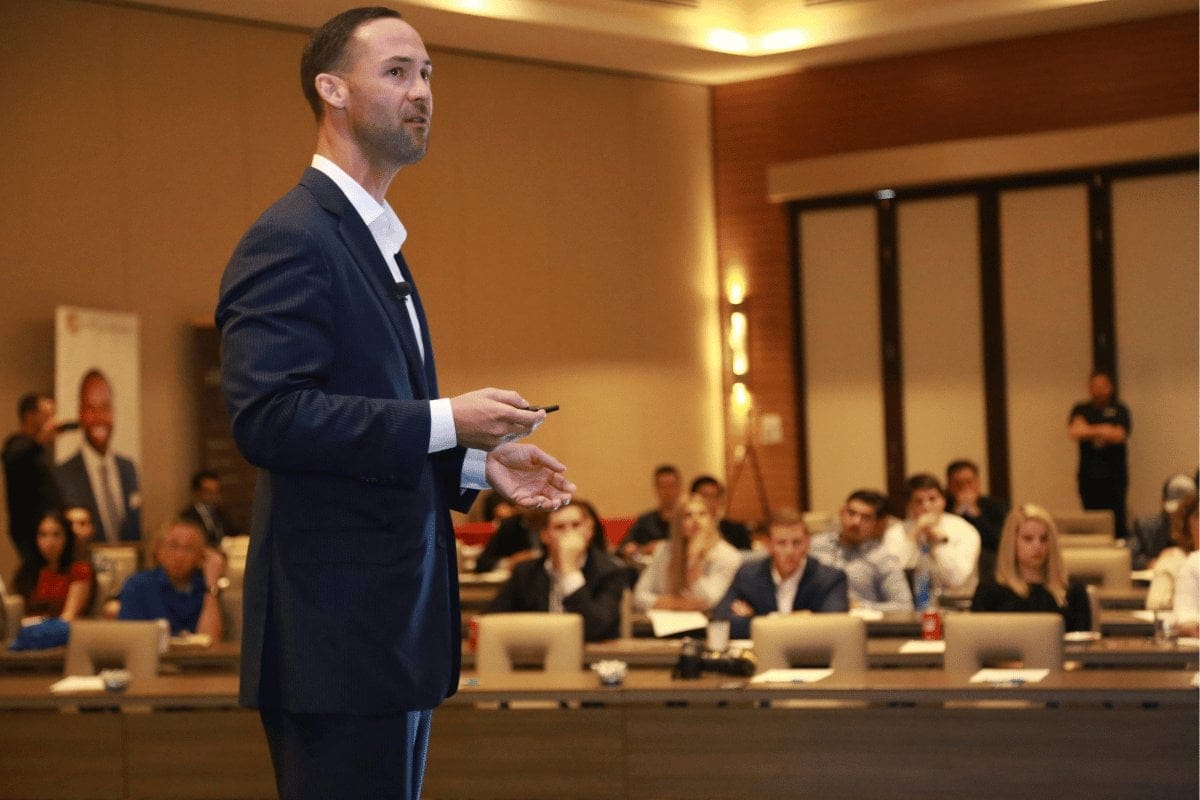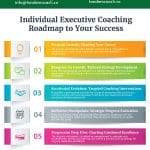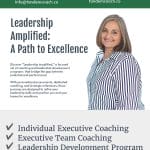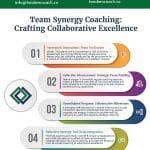Being an executive these days is tough, even if you’re a CXO, VP, director, or other top-level leader. You likely already have the hard skills down, but keeping your edge takes constant growth.
That’s where executive coaches come in. They work with accomplished professionals like you and equip you with the mindset, emotional intelligence, and confidence you need to excel.
At Tandem Coaching, we offer a sophisticated executive coaching program for top-level executives like you. Think of us as your strategic thought partner to help strengthen your decision-making, communication, and ability to drive results.
Let’s explore how partnering with an executive coach can take your impact to the next level.
What is an Executive Coach?
An executive coach is a certified professional who works one-on-one with executives and high-level leaders to help improve their work performance, meet goals, and tackle workplace challenges.
Your coach won’t tell you exactly what to do. Instead, they’ll ask thoughtful questions, challenge your thinking and assumptions, and give insights to help you see your strengths and weaknesses.
They’ll brainstorm strategies with you, help you overcome roadblocks, track your progress, and, most importantly, keep you accountable. This will let you gain self-awareness so you can set more ambitious goals.
What Does an Executive Coach Do?
Executive coaches wear many hats, but their primary role is supporting and challenging you to become your best version.
Here’s a closer look at what an executive coach typically does to help you:
- Achieve better work-life balance
- Manage stress and avoid burnout
- Improve strategic thinking and decision-making
- Develop emotional intelligence
- Manage time and priorities more effectively
- Enhance communication and presentation skills
- Build confidence and overcome imposter syndrome
- Increase motivation and resilience
- Strengthen abilities to direct teams
- Develop political savvy and executive presence
- Facilitate transitions to new roles or responsibilities
Above all, an executive coach listens closely to understand your goals and challenges. They encourage ongoing self-reflection while holding you accountable to make strategic career growth.

Who is Executive Coaching For?
According to a Harvard Business Review report, coaching was mainly about fixing toxic behavior at the top during the early 2000s’. Today, it’s primarily used to develop professionals who want to make a bigger impact in their roles.
The survey found the top reasons for coaching are:
- Help with transitions: 48%
- Provide a sounding board: 26%
- Address unproductive behaviors: 12%
Executive coaching can benefit top-of-the-line professionals like:
- C-level Executives: CEOs, CFOs, and CTOs.
- Senior Leaders: VPs, Directors, and other high-level decision-makers.
- High-Potential Performers: Emerging employees who will be future executives.
Professionals often start coaching when transitioning to a new role or looking to improve their skills in key areas.
Why is Executive Coaching Important?
Here’s how executive coaching benefits you:
- You’ll better understand your strengths and weaknesses. This self-awareness helps you achieve your goals.
- You’ll improve skills like communication, decision-making, and strategic thinking.
- You’ll become more confident in your abilities and feel more motivated.
- You’ll be able to tackle challenges and thrive in your current role.
- You’ll unlock your full potential to maximize your performance.
Basically, coaching is a win-win. It helps you maximize your impact while also building a stronger company. According to the International Coaching Federation report, investing in you pays off big time—over 86% of companies see a good return from coaching.
So make sure to improve things. Partner with a coach at Tandem Coaching right now for the customized support you need to reach your goals.

List of Executive Coaching Credentials
Look for proper credentials when seeking an executive coach.
The International Coach Federation (ICF) offers three levels of coaching credentials, each requiring increasing levels of education and experience:
1. Associate Certified Coach (ACC)
To qualify for the ACC, coaches must:
- Complete at least 60 hours of coach-specific education
- Document at least 100 hours of client coaching experience
- Complete 10 hours of mentor coaching with a credentialed mentor coach
- Pass the Coach Knowledge Assessment exam
The ACC confirms foundational coaching skills and ethical practices.
2. Professional Certified Coach (PCC)
The PCC requires:
- At least 125 hours of coach-specific coaching
- 500+ hours of client coaching experience
- Mentor coaching from a credentialed mentor
- Passing scores on both the Coach Knowledge Assessment and Proficiency Evaluation
The PCC demonstrates significant skill and experience as a coach.
3. Master Certified Coach (MCC)
Considered the gold standard, the MCC necessitates:
- 200+ hours of coaching education
- 2,500+ hours of client coaching experience
- Ongoing mentor coaching
- Passing the MCC exam

Executive Coaching Process
The executive coaching process typically follows a structured approach that can be customized to your needs and goals.
Many coaches followed the GROW model in corporate settings during the 1980s. GROW focuses on setting goals, examining current reality, brainstorming options and obstacles, and deciding the way forward.
Other standard coaching models include:
- FUEL: This approach focuses on determining the current situation, understanding motivation, examining options, and laying out a plan.
- SOAR: Centers on strengths, opportunities, aspirations, and results.
- Fierce Conversations: Revolves around interrogating reality, prompting learning, tackling challenging issues, and determining action.
- Purpose, Perspectives, Process: Focuses on aligning to purpose, shifting perspectives, and following a process.
At Tandem Coaching, our approach combines different models based on your current situation and desired outcome.
We mainly follow the ASPIRE method (Assess, Strategize, Practice, Implement, Review, Excel) for coaching, which we believe is the most effective for today’s executive.
Here’s an overview of what you can expect:
- Initial Assessment: The coach interviews you and gathers background info. You may take some short surveys too.
- Goal Setting: You’ll establish clear, measurable desired outcomes to work towards.
- Action Planning: Your coach will partner with you to develop strategies to reach your goals.
- Regular Sessions: You’ll meet weekly or every other week. Your coach will provide exercises and ask thoughtful questions to drive your growth.
- Assignments: You’ll get short tasks or exercises between sessions to reinforce your learning.
- Feedback & Reflection: Your coach will give ongoing input and have you reflect on your progress.
- Progress Reviews: You and your coach will periodically review your progress and adjust your plan if necessary.
- Final Evaluation: You’ll assess the outcomes from coaching and plan the next steps for continued growth.
The process is customized around your needs and goals, but this is what an executive coaching program generally looks like.
With the right coach in your corner, you’ll be unstoppable!
Executive Coaching Goals
The goals you’ll work on with a coach depend on what you want to improve.
But some typical things we help you with are:
- Getting better at thinking strategically and making decisions
- Building key authoritative skills like public speaking, managing teams, and influencing others
- Improving time management and productivity
- Strengthening how you communicate and build relationships
- Gaining more confidence in yourself as an authority
- Learning how to manage stress and roll with challenges
- Developing whatever skills you need for a promotion or career switch
One Fortune 500 study found that coaching delivered a 788% ROI overall. 77% of respondents said coaching significantly benefited at least 1 of 9 business measures, such as productivity, employee satisfaction, quality, and financial results.
Even excluding retention benefits, coaching gave a 529% ROI!
Setting SMART (specific, measurable, achievable, relevant, and time-based) goals is vital. Keep them specific and focused so you and your coach can track progress and success.

Frequently Asked Questions (FAQs)
Executive coaching is an investment, so having questions before starting is natural.
Here are answers to some frequently asked questions:
What is a Certified Executive Coach? How Does That Differ?
A certified executive coach holds an active credential from the International Coaching Federation (ICF) or another accredited program. This validates that the coach has met stringent requirements through demonstrated coaching experience and expertise.
A certified coach has:
- Gone through education and assessment to prove their skills
- Promised to follow ICF’s code of ethics and core coaching competencies
- Ongoing professional development and education
Commitment to excellence and professional standards
Certification shows the coach meets high standards. A certified coach is more likely to help you succeed.
How Much Does Executive Coaching Cost?
The cost of executive coaching can vary widely depending on the coach’s credentials and the types of services provided.
More experienced coaches with advanced certifications tend to charge higher rates. Also, direct contracts between you and a coach are generally less expensive than corporate coaching arrangements.
While cost is one consideration, the value of coaching extends beyond the fees charged. Without coaching, there may be greater costs associated with a lack of professional development and missed opportunities.
In general, you get what you pay for when it comes to coaching, so we recommend that you invest in the most qualified coach you can afford.
What Makes a Good Executive Coach?
Look for an executive coach with prior business experience, proven coaching success, excellent listening skills, and credentials from a respected program. Personal rapport is also key—you would want a coach to whom you feel comfortable opening up.
Conclusion
Getting an executive coach can be a game-changer for your career.
At Tandem Coaching, we’re passionate about helping executives accelerate their organizational skills. Our customized coaching programs deliver real growth through expert support, tailored plans, and structured accountability.
Our coaches blend real business experience with care for your success. We empower you with strategic skills, emotional intelligence, and confidence to crush your goals.
Let’s chat about starting coaching if you’re ready to step up! We can’t wait to learn about and help you achieve your goals!


















